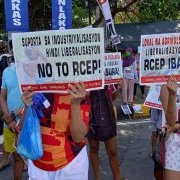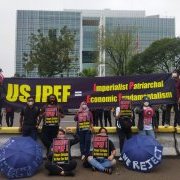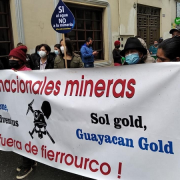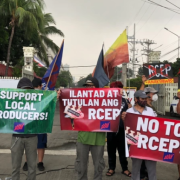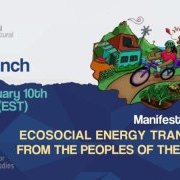4-Apr-2023
The Conversation
Australian business figure Clive Palmer is suing the Australian government for almost A$300 billion in an international tribunal, having lost a case against the Western Australian government he took all the way to the High Court.
31-Mar-2023
Global Justice Now
Joining the Pacific trade deal is a reckless gamble by a government willing to sacrifice British farmers, workers and the planet in its desperation for a symbolic success.
28-Mar-2023
The Left in the European Parliament
This report shows how Big Tech companies are working to constrain the ability of EU democratic bodies to regulate their activities in the public interest through “trade” agreements, which are binding and permanent.
23-Mar-2023
Friends of the Earth Europe
Documents leaked reveal that the EU-Mercosur deal’s proposed annex, supposedly intended to safeguard the environment, climate and human rights, does nothing to achieve this.
15-Mar-2023
Solidaritas Perempuan
Indonesian Civil Society held a protest today in front of the US Embassy in Jakarta to express its rejection of the IPEF. In the midst of the global economic crisis, the US is trying to rebuild its national industrialisation with a less open free trade agreement and push for policy harmonisation based on US standards.
10-Mar-2023
Rosa Luxemburg Stiftung
Looking at the proposed Free Trade Agreement between India and the European Union.
6-Mar-2023
bilaterals.org
The idea of ‘Trade in services’ is an artificial creation of the late 1970s and 1980s, designed to bring the social and public phenomenon of services under international ‘trade’ rules that would work for corporations.
2-Mar-2023
Third World Network
Efforts to curb the ruinous business practices of the Big Tech corporations are at risk of being impeded by “digital trade” rules negotiated in international trade pacts. It is time to overturn this anti-regulatory agenda in favour of a governance model that prioritizes digital industrialization and data as a public good.
2-Mar-2023
Radio Free Asia
Civil groups urged the European Parliament to step up pressure on Vietnam to improve its dismal human and labor rights records during a review of the implementation of the European Union-Vietnam Free Trade Agreement.
1-Mar-2023
Friends of the Earth Europe
Despite the ongoing devastation, and with the Amazon likely at an irreversible environmental tipping point, the European Union continues to push for a free trade agreement with Mercosur which would increase the pressure on the region.
28-Feb-2023
Ibon International
The US is trying to present IPEF as a rethinking of the aggressive trade liberalisation model it championed for the last four decades. At its core, however, IPEF appears to be mainly a geopolitical tool for the US to maintain its hegemony in the Asia-Pacific.
24-Feb-2023
The Kilusang Magbubukid ng Pilipinas
The Senate should withhold its concurrence with the treaty until the necessary policies, strategies, and programs are emplaced so that the RCEP benefits, and does not harm, the agricultural sector and the economy as a whole.
21-Feb-2023
The Kilusang Magbubukid ng Pilipinas
The Kilusang Magbubukid ng Pilipinas said the Philippines’ agriculture sector stands to lose the most under the Regional Comprehensive Economic Partnership (RCEP) trade agreements.
15-Feb-2023
Peace Brigades International - Canada
Colombia is now facing thirteen investor-state dispute settlement (ISDS) claims in process and eight more in initial stages that total an estimated USD $2 billion.
13-Feb-2023
Foreign Policy in Focus
A new manifesto critiques the "clean energy" transitions of the Global North and offers an alternative vision from the Global South.








